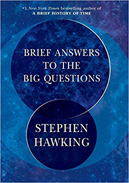
 |
Brief Answers to the Big Questions
by Stephen Hawking
Bantam Books
Written at the end of his life, although formulated during and published posthumously, the once in a lifetime scientist Stephen Hawking lands serious scientific questions with a philosophical bent. He guides us by the hand through the creation of the universe, the mystery of black holes, and the possibilities of time travel, giving nods to the seminal pioneers of each discovery along the way. And like all the great thinkers, he’s unafraid to tackle the existence of God and the future of mankind on the planet.
The deft way in which Hawking nails down his points is one of his great gifts as a lecturer. For example, he explains why alien sightings are likely a ruse: its secretive nature. It’s a forgone conclusion that a visiting alien species would be superior in knowledge and ability, but the alleged well-meaning aliens are doing a very poor job helping us with future concerns. Conversely, a less than noble alien visitation would be painfully obvious to all. Anyway you position potential alien visits, it’s likely they’d be obvious by now.
When it comes to time travel, Hawking muses that it hasn’t happened. Perhaps Einstein’s limitation that nothing can move faster than light—the theorized condition for moving backward in time—is true, or perhaps man never achieved the ability in the future. Either way, Hawking makes plain, if man could travel back in time, we’d be bumping into time travelers from the future visiting us in present day. Furthermore, it’s human nature to meddle, as time travelers certainly would in our current day and age.
Superior at scientific explanation and pedestrian at philosophy and politics, the answers to the larger, cutting-edge questions of physics, and a few cultural musings, are delivered with aplomb. Hawking’s good heart and humanity shine through and charm the reader. Quantum physics is the central theme, although much of the verbiage if taken slowly will be accessible to the layman. It’s not important that you understand everything, only that you witness one of the century's great minds at work.
RECOMMENDED by the US Review
Next Focus Review
Previous Focus Review